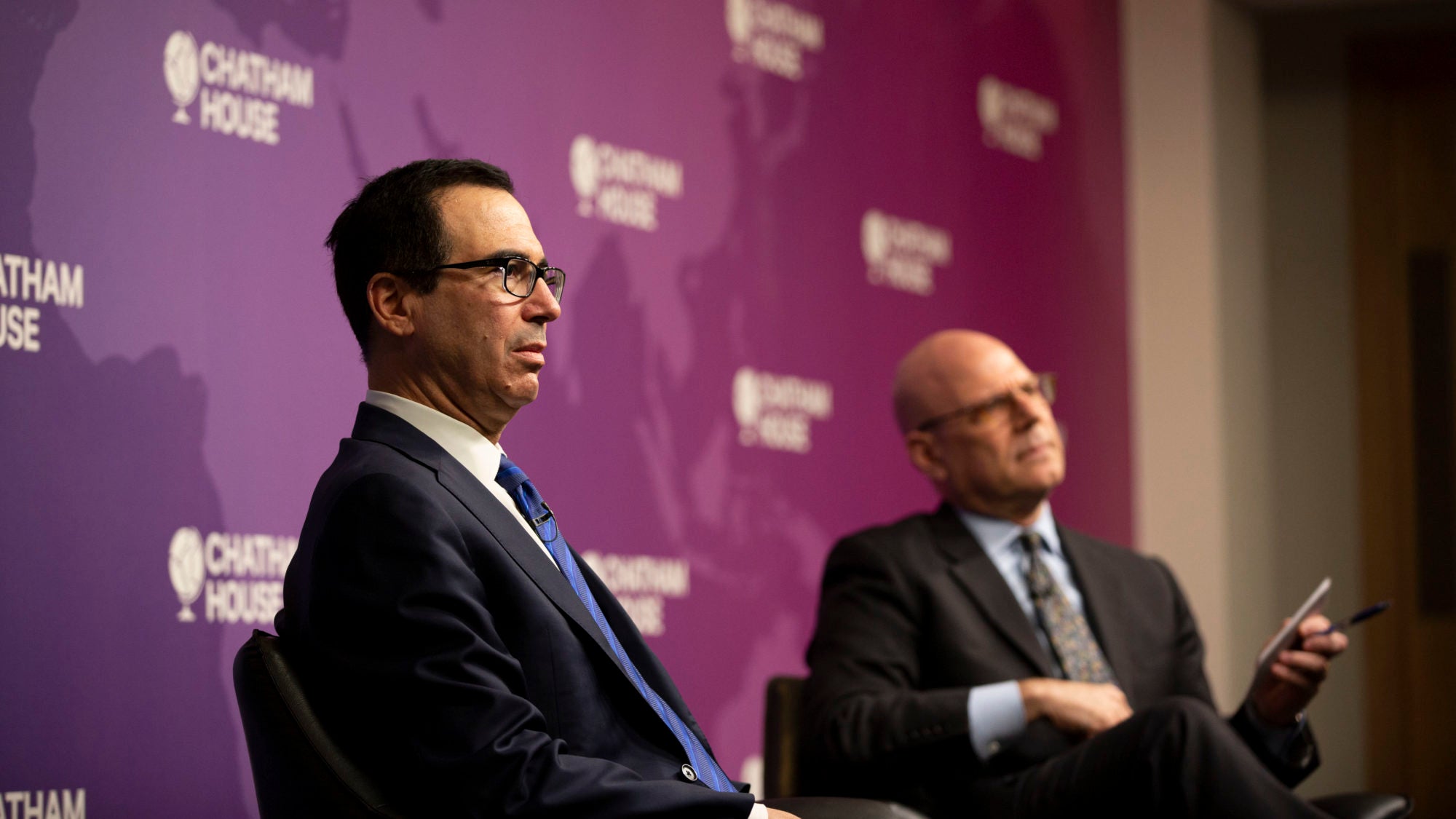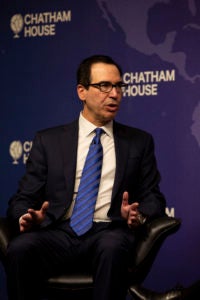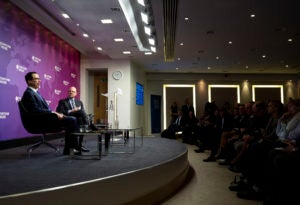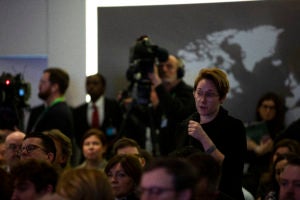
Title: U.S. Secretary of the Treasury Steven T. Mnuchin Delivers Lloyd George Centennial Lecture
On Saturday, January 25, as part of the SFS Centennial celebration in London, U.S. Secretary of the Treasury Steven T. Mnuchin delivered a Lloyd George Centennial Lecture on the future of the global economic order. The event, co-sponsored by the SFS and Chatham House, also featured introductory remarks from Dr. Robin Niblett, Director of Chatham House, a moderated discussion between Sec. Mnuchin and SFS Dean Joel Hellman, and closing remarks from Lord Jim O’Neill, Chair of Chatham House.
In the year that both SFS and Chatham House celebrate their centennial anniversary, Niblett called the event “a perfect way to mark this shared bond between our two institutions, both founded through the idea of dialogue.”

Predictions for the Future of the World Order
Hellman began the conversation with Mnuchin by asking him to describe the three main trends he believes will shape the future global world order. Mnuchin listed his top three as technology, access to stable global energy markets, and economic growth and job creation.
Technology, Mnuchin said, “has been very transformational over the 100 years in every single aspect of our economy, of our world order.” In his explanation of the importance of global energy markets, Mnuchin drew attention to the unequal distribution of energy and electricity access across the globe. “Although there’s an abundance of energy, there’s a significant number of people in the world that don’t have access to electricity. So, as much as there are environmental issues, I think we also have to get more people who can take advantage of these things.”
Lastly, Mnuchin discussed the importance of economic opportunity, not only today but in the future. “I think that the next generation wants to feel that they have the same or better opportunities. It’s important on an individual country basis and on a global basis that we are creating economic growth, because that’s what creates jobs, and that’s what creates opportunities,” he said.
“Fair, Reciprocal Trade”: Phase One of the U.S.-China Trade Deal
The conversation then turned to Phase One of the U.S.-China trade deal, signed on January 15, 2020. Mnuchin noted its significance, both to the world and the United States. “This is, one, a very important economic relationship. And two, more importantly, I think opening up China to the U.S. and Europe and others, competing on a fair basis is very important,” he said.
Above all, Mnuchin emphasized the focus of Phase One of the trade deal: “fair, reciprocal trade.” He pointed out commitments to technology transfer issues, patent protection, financial services, currency protection, and agriculture, which are included in the agreement for the first time. Noting the presence of enforcement provisions in the agreement, Mnuchin predicted, “I think that that will be a major factor helping economic growth this year.”

The U.S.-UK Trade Relationship
The conversation then shifted to a topic closer to home for many of the audience members: U.S.-UK trade relations. Mnuchin affirmed the importance of the two countries’ relationship, adding that “It’s a very strategic relationship.”
Mnuchin appeared optimistic about the future of the trade relationship, commenting, “We’ve said that our goal is to try to get both of these trade agreements done this year. I think from the U.S. standpoint, we are prepared to dedicate a lot of resources.”
Sanctions and Tariffs: Tools for Foreign Policy
The conversation also touched on two prominent features of the Trump administration’s economic policy: tariffs and sanctions. Mnuchin emphasized that tariffs, though unpopular at times, are effective. “Not everybody loves the president’s tariffs, but there’s no question that the tariffs are a very important factor in changing behavior.”
Mnuchin sees sanctions as critical for American national security, but acknowledges that they may incur future costs. “Our European friends and allies may not always like what we’re doing on sanctions[…]I do seriously think that we have a responsibility to use sanctions for important national security issues, but we need to think about the long-term impact on the global currency,” he said.

Balancing Economic Growth with Environmental Concerns
Following his remarks, Mnuchin also took questions from the audience. SFS alumna Rebecca Martin (MAGES’19) asked, “How do we balance [emphasis on economic growth] with rising environmental concerns?” Mnuchin responded, “There are a lot of important issues that will impact the world and the economy, and I just hope that we balance these other issues and we talk about these other issues as much as we talk about the environment.”
Lord Jim O’Neill, Chair of Chatham House, delivered the event’s closing remarks. He described the secretary’s approach to the shifting landscape of U.S.-UK relations as “a refreshing change to what I would call status quo thinking of the past 25, 30 years of the international consensus.”